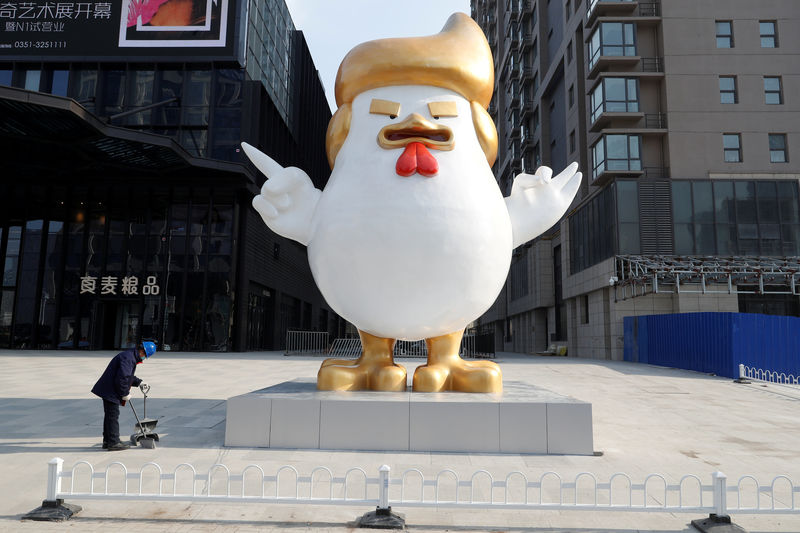By Nichola Saminather
SINGAPORE (Reuters) - Ahead of U.S. President-elect Donald Trump's inauguration this week, investors in Asian assets are warily betting he won't make good on his promise to create $1 trillion of new infrastructure over the next 10 years.
Rather, they're positioned for a "Goldilocks" scenario, with U.S. fiscal spending just high enough to lift growth without sucking too much capital out of emerging markets.
Political hurdles and constraints on materials and labor will likely keep spending below Trump's promised level, but the need to lift the economy after years mired in the doldrums will still ensure a sizeable dose of stimulus, investors expect.
"If interest rates get very high, and things get overheated, then we come back to (a risk averse environment)," said Josh Crabb, head of Asian equities at Old Mutual Global Investors in Hong Kong. "But the bit in between, that's a very, very sweet spot for some of these assets that have been beaten up around the region."
Crabb holds cheaper, "cyclical" stocks, sectors like basic materials and financials, that bloom during economic upturns. He also likes South Korea, Asia's cheapest major market.
The KOSPI index (KS11) is trading at a 12.1 times earnings, compared with the region's priciest emerging market, the Philippines, at 19.28, according to Thomson Reuters Eikon data.
COMMODITIES, EXPORTERS FAVORED
Vishnu Varathan, head of Asia economics and strategy at Mizuho Bank's Treasury division expects U.S. infrastructure investment to reach about $550 billion, providing a lift to Asian exporters.
"Under the Goldilocks scenario, we ensure that costs don't rise so fast that it stifles demand," he said. "We’d find a more durable recovery in global demand... and that effect cascades down to other exporters. This is going to be quite positive for Asia, which is either home to major capital goods producers outside of Germany, or linked via the supply chain."
The former include China, Japan and South Korea, and the latter Taiwan and Thailand, he said.
That anticipated spillover effect is sending investors, who piled into safer assets last year, searching for bargains again - a move that some investors expect to benefit Asian stocks.
The MSCI Asia ex-Japan <.MIAX00000PUS> is trading at 2.6 times book value, compared with the S&P 500's (SPX) 6.8 times.
Jean-Charles Sambor, deputy head of emerging markets debt at BNP Paribas (PA:BNPP) Investment Partners, sees more gains for exporters of commodities.
"If the U.S. goes ahead with some infrastructure spending and doesn't have a very negative agenda toward Mexico and China, you should see some emerging markets doing well because of higher commodity prices," he said.
Sambor prefers the debt of Russia, Latin America and Indonesia, which would benefit from the higher demand for raw materials driven by Trump's infrastructure push. Expecting the dollar to moderate in the medium term, he likes their local-currency bonds.
PROTECTIONISM FEARS
Still, after a presidential campaign filled with fiery rhetoric and few policy details, investors remain nervous ahead of Trump's swearing-in on Friday that his protectionist promises, if fulfilled, could erode the benefits to emerging markets from moderate fiscal stimulus.
Trump has threatened a 45 percent tariff on imports from China and a 35 percent border tax on imports by U.S. companies shipping jobs overseas.
He has also pledged a one-off tax rate cut for U.S. firms bringing money held overseas back home to 10 percent from 35 percent. U.S. corporations have $2.6 trillion stashed abroad and any rapid repatriation could wreck havoc on Asian markets.
Concerns about such moves led global bond investors to reduce allocations to Asia ex-Japan to 2.2 percent in December from 4.2 percent, and equity investors to go to 6.4 percent from 6.9 percent, according to a Reuters poll. [nL5N1EG3W9]
Contradictions from the Trump camp and warnings that U.S. inflation and interest rates could rise too fast also have investors worried.
Trump said over the weekend a too strong dollar was keeping U.S. companies from competing effectively with China, even as his policies look set to push it higher.
The dollar has risen 9.1 percent against the Japanese yen, and 3.6 percent versus a basket of six major global peers since Trump's surprise election win in November.
A growing chorus of Fed officials has warned a sustained widening of the budget deficit could cause the U.S. economy to overheat, requiring more aggressive rate hikes. [nL1N1F70YD]
In such a situation, BNP Paribas's Sambor said he would turn defensive and shelter in cash, taking short positions in emerging market currencies.
While Deutsche Wealth Management expects Trump to deliver less than the promised quantum of infrastructure investment, Tuan Huynh, its Asia-Pacific chief investment officer, nevertheless prefers markets in Asia with their own internal engines.
Deutsche prefers Indonesia and the Philippines investment grade and sovereign bonds, as their governments are more stable than other emerging markets like Latin America. Stocks in Indonesia and India, which are more driven by domestic demand and have younger populations, are also attractive, Huynh said.
Ultimately, economic and political constraints for Trump mean worst-case scenarios for Asia are unlikely to eventuate.

"Whatever happens, what Donald Trump is going to be doing is eking out a little bit more growth for longer in a geriatric economic cycle," said Kit Juckes, global fixed income strategist at Societe Generale (PA:SOGN).